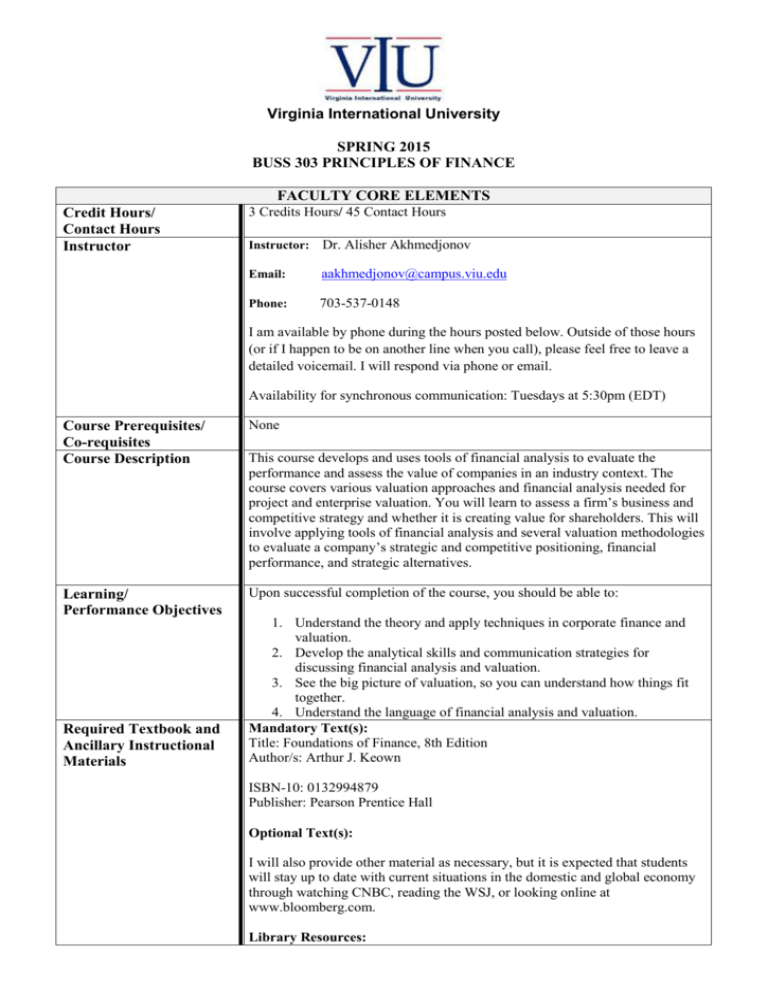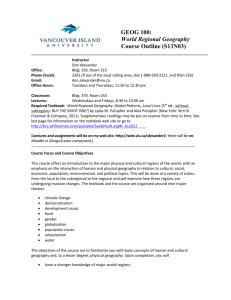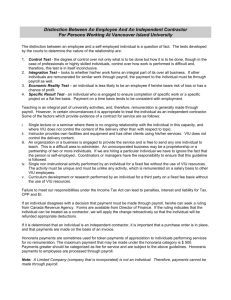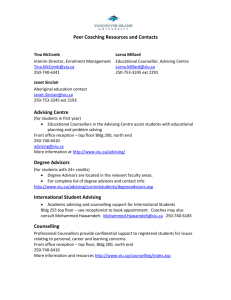
Virginia International University
SPRING 2015
BUSS 303 PRINCIPLES OF FINANCE
FACULTY CORE ELEMENTS
Credit Hours/
Contact Hours
Instructor
3 Credits Hours/ 45 Contact Hours
Instructor:
Dr. Alisher Akhmedjonov
Email:
aakhmedjonov@campus.viu.edu
Phone:
703-537-0148
I am available by phone during the hours posted below. Outside of those hours
(or if I happen to be on another line when you call), please feel free to leave a
detailed voicemail. I will respond via phone or email.
Availability for synchronous communication: Tuesdays at 5:30pm (EDT)
Course Prerequisites/
Co-requisites
Course Description
None
Learning/
Performance Objectives
Upon successful completion of the course, you should be able to:
Required Textbook and
Ancillary Instructional
Materials
This course develops and uses tools of financial analysis to evaluate the
performance and assess the value of companies in an industry context. The
course covers various valuation approaches and financial analysis needed for
project and enterprise valuation. You will learn to assess a firm’s business and
competitive strategy and whether it is creating value for shareholders. This will
involve applying tools of financial analysis and several valuation methodologies
to evaluate a company’s strategic and competitive positioning, financial
performance, and strategic alternatives.
1. Understand the theory and apply techniques in corporate finance and
valuation.
2. Develop the analytical skills and communication strategies for
discussing financial analysis and valuation.
3. See the big picture of valuation, so you can understand how things fit
together.
4. Understand the language of financial analysis and valuation.
Mandatory Text(s):
Title: Foundations of Finance, 8th Edition
Author/s: Arthur J. Keown
ISBN-10: 0132994879
Publisher: Pearson Prentice Hall
Optional Text(s):
I will also provide other material as necessary, but it is expected that students
will stay up to date with current situations in the domestic and global economy
through watching CNBC, reading the WSJ, or looking online at
www.bloomberg.com.
Library Resources:
The VIU Library is located in the Pender Building. The Library also provides
students with access to two (2) online libraries, LIRN and e.brary which can be
accessed by clicking on http://library.viu.edu.
LIRN (Library and Information Research Network): www.lirn.net, and
e.brary http://site.ebrary.com/lib/viulibrary.
Writing, Research, And Media Center:
The Writing, Research, and Media Center at VIU serves to support students in a
way that allows for enhanced growth and ability to communicate in writing for
their various fields of study. Students are provided one-on-one sessions to target
specific needs in order to allow for students to develop skills for long term
success
Resources for the WRMC are provide here: www.viu.edu/wrmc
Moodle Support and VIU IT Help Desk
Should you encounter any problems, please feel free to contact the VIU
technical helpdesk. Technical support can be accessed through VIU's IT
department: http://it.viu.edu/
Other Useful Web Sites:
http://finance.yahoo.com
https://www.economist.com
www.stls.frb.org
www.ny.frb.org
www.bloomberg.com
www.wsj.com
http://www.forbes.com/
Instructional Methods
VIU Grading System
Course Grading Scale
Lectures, class discussions, and individual assignments
The grades of A, A-, B+, B, B-, C+, and C are passing grades, and C-, D+, D,
D- and F are failing grades for graduate level courses. The grades of A, A-, B+,
B, B-, C+, C, C-, D+, D, and D- passing grades, and F is failing grade for
undergraduate level courses. The grade of S is passing grade and U is failing
grade for ESL courses. The grade of “I” (Incomplete) is given to a student
whose work has been of passing quality but who has, for compelling reasons,
been unable to complete all of his or her required coursework by the end of the
semester. The quality of performance in any academic course is reported by a
letter grade. These grades denote the character of work and are assigned grade
points as follows:
A 100-95
A- 94-90
B+ 89- 85
B 84 - 80
B- 79- 75
C+ 74-70
C 69-65
C- 64-60
D+ 59-55
D 54-50
D- 49 -45
PERCENTAGE
Assignments/Quizzes (2 @ 12%)
24%
Attendance/Participation (16 @ 1%)
16%
Midterm Exam
30%
Final Exam
30%
Total
Syllabus Last
Revised Date
F 44-0
100%
August 22, 2014
STUDENT CORE ELEMENTS
All students are expected to act with civility and personal integrity; respect other
Students Rights,
Responsibilities and Code students' dignity, rights and property; and help create and maintain an environment in
which everyone can succeed through the fruits of their own efforts. Academic integrity
of Conduct
Revised 3/9/16 10:07 PM
2
includes a commitment to not engage in or tolerate acts of academic dishonesty.
Academic dishonesty involves one of the following:
1) cheating on an examination or quiz;
2) buying, selling, stealing, or soliciting any material purported to be the
unreleased contents of a forthcoming examination, or the use of such
material;
3) substituting for another person during an examination or allowing such
substitution for one’s self;
4) plagiarizing, the act of appropriating passages from the work of another
individual, either word for word or in substance, and representing them as
one’s own work;
5) colluding with another person in the preparation or editing of
assignments submitted for credit, unless such collaboration has been
approved in advance by the instructor;
6) copying the institution’s software without permission of the copyright
holder or placing personal software on the institution’s computers or
damaging or destroying software or computers;
and other forms of academic dishonesty include selling or purchasing examinations,
papers or other assignments and submitting or resubmitting the same paper for two
different classes without explicit authorization.
Plagiarism Policy
When an instructor suspects academic or non-academic dishonesty, the faculty member
will exercise her/his academic judgment in light of the particular circumstances and the
student’s academic history. Consultation with the Vice President of Academic Affairs
and/or the department chair throughout the process is encouraged.
Plagiarism is a serious offense in the School of Business as we are preparing candidates
who will assume positions with international business organizations requiring high
degrees of trust, ethics, and legal responsibilities. Although plagiarism is defined and
viewed differently depending upon the culture, the VIU School of Business defines
plagiarism as follows:
1. Turning in someone else's work as your own
2. Copying words or ideas from someone else without giving credit
3. Using your own work from a previous course and not citing that work as such
4. Failing to put a quotation in quotation marks
5. Giving incorrect information about the source of a quotation
6. Changing words but copying the sentence structure of a source without giving
credit
7. Copying so many words or ideas from a source that it makes up the majority of
your work, whether you give credit or not
Plagiarism is an act of fraud. It involves both stealing someone else's work and
lying about it afterward.
Most cases of plagiarism can be avoided, however, by citing sources. Simply
acknowledging that certain material has been borrowed and providing your audience
with the information necessary to find that source is usually enough to prevent
plagiarism.
(Credited Source: http://plagiarism.org/plagiarism-101/what-is-plagiarism)
Student Complaint Policy
VIU Formal Complaint Procedure
VIU faculty and staff attempt to create, in all areas, an atmosphere that is conducive to
learning. For this reason, VIU has established a procedure to address any school-related
problems, concerns, or complaints. Most academic concerns will be handled by the
instructors directly:
Revised 3/9/16 10:07 PM
3
1.
2.
3.
Verify Student
Enrollment
Inclement Weather
Policy
Attendance Policy
VIU Online
Students should first discuss the problem with the instructor.
Then with the Dean of the School, if necessary.
If the problem is not resolved at that level, the student should then contact the Vice
President of Academic Affairs.
VIU team members maintain an open-door policy. Students may express concerns to
any administrator. Complaints, however, are best handled by following the above-stated
procedure. At the written request of the student, an ad-hoc Grievance Committee
comprised of the Vice President of Academic Affairs, one senior faculty member, the
Dean of the School, and other invited staff or faculty. The Committee will convene to
address concerns which remain unresolved. The ad-hoc Grievance Committee will
convene within ten (10) working days of a written request from the student. The student
will be notified of the committee’s decision within three working days of the meeting. If
after following the above stated procedure, the student feels that his or her concerns
have not been resolved, he or she may address these concerns in writing to the
following organizations.
It is the student’s responsibility to verify that s/he is enrolled as a student in this course.
Students attending an incorrect course or not registering for the proper course risk
losing credit for the course they are required to take, losing the money paid for the
course, being dropped from the course that are required to take as well as risking their
F1 student status due to their not being enrolled as a full-time student.
Students may encounter problems including inclement weather on occasion and should
inform their instructor should there be any issues as soon as possible.
The University faculty strive to provide a quality learning environment for all students.
Therefore, good academic standing requires participation of students in all class-related
activities. Therefore, attendance at VIU is mandatory. There are only two acceptable
reasons for absence from class:
1) serious illness on the part of the student or
2) a family emergency.
Absence for unexcused reasons may negatively affect the student’s final course grade.
Attendance in an online classroom for a given week is based the student’s engagement
in an academically related activity that can be documented.
The following are academically related activities for the purposes of attendance:
Meaningful participation in an online discussion
Quizzes, tests, assignment submissions, and other work that is graded by the
instructor.
Student initiating contact with a faculty member to ask a course-related
question via email or chat room
The following are not acceptable for purposes of attendance:
Student-tracking of course site login
Student posting of bio in Discussion forum
Attendance in the VIU online classroom is collected in weekly cycles. For
administrative purposes, the date that attendance is recorded for is the Sunday of each
week, regardless of the day of the week on which the semester starts. If a week spans
over two months, the attendance for that week will be reported as a part of the later
month. A weekly unit in VIU Online Education consist of activities that students are
engaged in from a Monday to the following Sunday.
The last day of attendance of an online class is defined as the last day in which the
student was engaged in an academically related activity that can be documented.
Cell Phone and Other
Media Use Policy
VIU’s Americans with
Disabilities (ADA Policy)
As in the professional environment, the use of cell phones and other multi-media tools
should not be used during synchronous communication during the course.
Virginia International University is committed to ensuring that all of its facilities and
programs are accessible to all persons. If you believe you may qualify for course
adaptations or accommodations in accordance with the Americans with Disabilities Act
and/or Section 504 of the Rehabilitation Act, it is your responsibility to contact Human
Revised 3/9/16 10:07 PM
4
Email Policy
Additional Information
Regarding VIU Policies
Additional Course
Specific Policies
Resources for an accommodation approval letter. Once you have coordinated services
with Human Resources, please provide your letter of accommodation to the instructor
no later than the second class session.
All VIU students are required to use their provided VIU email addresses only when
communicating with VIU professors and or staff, submitting assignments, and all other
correspondence. Use of the VIU email system ensures that student emails are easily
recognized, documented through the VIU computer system, and allow the University to
maintain consistency and compliance in our electronic communication with students.
As a VIU student, it is your responsibility to check your VIU provided email daily
as this is the primary email address VIU uses to contact students.
Students should refer to the Virginia International University Handbook for additional
and/or more specific information on University policies and guidelines.
All work must be turned in on time according to the announced schedule. Schedule and
activities may be subject to change. Consult the class web site for the latest
information.
Assignment Submission Guidelines: Each assignment turned in must include the
following on a title page:
First Name, Last Name
Complete Date of Submission (Month Day, Year)
Course Number and Name (MBA 611 – Law)
Assignment Reference (Homework Assignment 3)
Page numbers
Assignment submissions must adhere to the APA standards, and use APA referencing
style.
The dynamics of coverage of topics and the deadlines of assignments are given in
Attachment A: Assignments and Course Calendar/Schedule
Late Work Policy: Assignment due dates will adhere to the following schedule:
Day 2 (Tuesday)
Initial Discussion Posts
Day 4 (Thursday)
Portfolio Assignments
Day 6 (Saturday)
Peer Response Posts
No assignments will be accepted beyond Day 7 of the current week unless approved by
the instructor.
Grades: You may expect to receive your grades and personal feedback no later than
four days after the due date for a given assignment. For example, feedback for your
portfolio assignments will be provided no later than Day 1 of the following week. Since
weekly discussions require an initial response due on Day 2) and responses posts (due
on Day 6), discussion grades will be posted on Day 3 of the following week.
Rubrics: Rubrics for each assignment will be provided with the directions for each
assignment in the online classroom. It is suggested that you use the rubric as a checklist
to ensure that your assignments meets the set criteria. Your instructor will use the rubric
to evaluate your work.
Keeping Your
Coursework
Course Evaluation
You will have access to your coursework from the course start date, until the last day of
the session. After that time, you will no longer be able to access the course or related
materials. We strongly recommend that you retain copies of your completed
assignments and any documents you wish to keep. The university is not responsible for
lost or missing coursework.
Two times during the session, once at or near the middle and once at the end of the
course, you will receive an e-mail inviting you to submit an online evaluation of the
course and instruction. All submitted course evaluations are confidential, and only
aggregate data and comments will be shared with the Instructor. No responses given
will affect your grade in any way. Your feedback is important in the VIU efforts to
Revised 3/9/16 10:07 PM
5
continuously improve programs.
ACADEMIC ELEMENTS
Syllabus Modification
Statement
Although this syllabus reflects the professors attempt to provide students with the most
accurate and current information regarding this course, the syllabus also represents a
living document which may require subsequent modification. Although no substantial
changes will be made in terms of the assignments, course grading policy, or course
structure, the professor for this course as well as the University/School reserve the right
to make modifications to the syllabus designed to improve the overall course deliver
and student satisfaction. In the event such modifications are necessary, students in this
course will be notified in writing along with the Dean’s Office for the School.
Curriculum Attachments
ATTACHMENT A: COURSE SCHEDULE
ATTACHMENT B: COURSE ASSIGNMENTS IN DETAIL
ATTACHMENT C: COURSE REFERENCE LIST
Revised 3/9/16 10:07 PM
6
ATTACHMENT A: COURSE SCHEDULE
DATE
TOPICS
TEXTBOOK & OTHER READINGS
Week 1
An Introduction to the Foundations of Financial
Analysis / The Financial Markets and Interest Rates
Chapters 1-2 of Keown
Week 2
Understanding Financial Statements and Cash Flows
Chapter 3 of Keown
Week 3
Evaluating a Firm’s Financial Performance
Chapter 4 of Keown
Week 4
The Time Value of Money
Chapter 5 of Keown
Week 5
The Meaning and Measurement of Risk and Return
Chapter 6 of Keown
Week 6
The Valuation and Characteristics of Bonds
Chapter 7 of Keown
Week 7
The Valuation and Characteristics of Stock
Chapter 8 of Keown
Week 8
Midterm Exam
Week 9
The Cost of Capital / Capital-Budgeting Techniques
and Practice
Chapters 9-10 of Keown
Week 10
Cash Flows and Other Topics in Capital Budgeting
Chapter 11 of Keown
Week 11
Determining the Financing Mix
Chapter 12 of Keown
Week 12
Dividend Policy and Internal Financing
Chapter 13 of Keown
Week 13
Short-Term Financial Planning
Chapter 14 of Keown
Week 14
Working-Capital Management
Chapter 15 of Keown
Week 15
International Business Finance
Chapter 16 of Keown
Week 16
Final Exam
Revised 3/9/16 10:07 PM
7
ATTACHMENT B: ASSIGNMENTS IN DETAIL
Below are the guidelines and descriptions of assignments for this course.
This course will have a midterm exam and a final exam.
Your midterm exam will consist of 8 questions and is going to be worth a total of 100 points (10 points each). You
should answer all questions. There will also be 2 bonus questions, each worth 10 points. Bonus problems will be
optional. Answers to questions should be typed, single spaced, of length no more than 1 page for each of the
questions, with 1" margins and type point not less than 12. Your midterm exam will be due Sunday of Week 4.
Your final exam will consist of 10 open-ended questions and is going to be worth a total of 100 points (each problem
will be worth 10 points). You should answer all ten questions. Answers to questions should be typed, single spaced, of
length no more than 1 page for each of the questions, with 1" margins and type point not less than 12. Your final exam
will be due Saturday of Week 8.
Revised 3/9/16 10:07 PM
8
ATTACHMENT C: COURSE REFERENCE LIST
Below are other optional readings for further enrichment regarding course content. These are intended to provide
other support or refreshment of topics relevant to the course that are or are not directly instructed upon during the
course.
In addition to the websites introduced in the textbook, you may find the following websites useful:
http://finance.yahoo.com
http://www.economist.com
http://www.stls.frb.org
http://www.ny.frb.org
http://www.bloomberg.com
http://www.wsj.com
http://www.forbes.com/
Revised 3/9/16 10:07 PM
9





